

Who Will Eclipse America? - not china, but US itself. Exit from comment view mode.
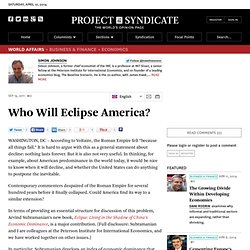
Click to hide this space WASHINGTON, DC – According to Voltaire, the Roman Empire fell “because all things fall.” It is hard to argue with this as a general statement about decline: nothing lasts forever. But it is also not very useful. In thinking, for example, about American predominance in the world today, it would be nice to know when it will decline, and whether the United States can do anything to postpone the inevitable. Contemporary commenters despaired of the Roman Empire for several hundred years before it finally collapsed. RMB's Journey to the World. Exit from comment view mode.
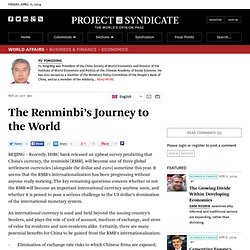
Click to hide this space BEIJING – Recently, HSBC bank released an upbeat survey predicting that China’s currency, the renminbi (RMB), will become one of three global settlement currencies (alongside the dollar and euro) sometime this year. It seems that the RMB’s internationalization has been progressing without anyone really noticing. The key remaining questions concern whether or not the RMB will become an important international currency anytime soon, and whether it is poised to pose a serious challenge to the US dollar’s domination of the international monetary system. An international currency is used and held beyond the issuing country’s borders, and plays the role of unit of account, medium of exchange, and store of value for residents and non-residents alike. . · Elimination of exchange-rate risks to which Chinese firms are exposed; Why is China buying more U.S. debt? China’s Monetary Sterilization. Exit from comment view mode.
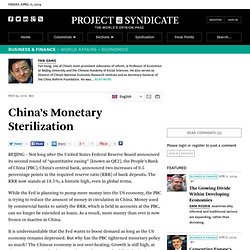
Click to hide this space BEIJING – Not long after the United States Federal Reserve Board announced its second round of “quantitative easing” (known as QE2), the People’s Bank of China (PBC), China’s central bank, announced two increases of 0.5 percentage points in the required reserve ratio (RRR) of bank deposits. The RRR now stands at 18.5%, a historic high, even in global terms. Overview of PBoC Instruments. As a seminar focusing on China’s monetary policy, we’ve always been interested in the use of monetary instruments by People’s Bank of China (PBoC).
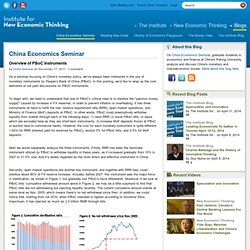
In this posting, we’d like to wrap up the core elements of our past discussions on PBoC instruments. To begin with, we need to understand that one of PBoC’s critical roles is to sterilize the "passive money supply" caused by increase in FX reserves, in order to prevent inflation or overheating. It has three instruments at hand to fulfill the role: reserve requirement rate (RRR), open market operations, and Ministry of Finance (MoF) deposits at PBoC. In other words, PBoC could preemptively withdraw liquidity from market through each of the following ways: 1) raise RRR; 2) issue PBoC bills, or repos which are excluded here as they are short-term instruments; 3) increase MoF deposits frozen at PBoC or auction less to commercial banks. Next we would separately analyze the three instruments.
Why did PBoC stop using bills to withdraw liquidity? China’s Great Migration (Rural to Cities) Exit from comment view mode.
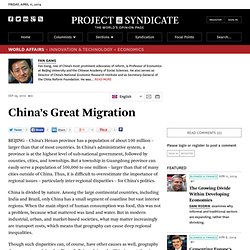
Click to hide this space BEIJING – China’s Henan province has a population of about 100 million – larger than that of most countries. In China’s administrative system, a province is at the highest level of sub-national government, followed by counties, cities, and townships. But a township in Guangdong province can easily serve a population of 500,000 to one million – larger than that of many cities outside of China. Thus, it is difficult to overestimate the importance of regional issues – particularly inter-regional disparities – for China’s politics. China is divided by nature. Though such disparities can, of course, have other causes as well, geography does seem to explain a lot.
China may have more and larger high-tech and service industries – sectors that do not depend so heavily on transport – in the future. Thus, regional disparities in terms of economic prosperity may never narrow; indeed, they could often widen. Conflict (states and central) Exit from comment view mode.
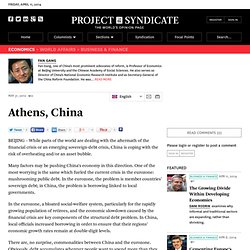
Click to hide this space BEIJING – While parts of the world are dealing with the aftermath of the financial crisis or an emerging sovereign-debt crisis, China is coping with the risk of overheating and/or an asset bubble. China’s Crippled Financial Sector. Exit from comment view mode.
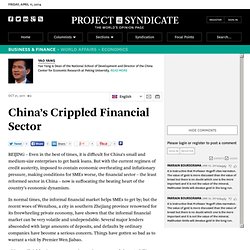
Click to hide this space BEIJING – Even in the best of times, it is difficult for China’s small and medium-size enterprises to get bank loans. But with the current regimen of credit austerity, imposed to contain economic overheating and inflationary pressure, making conditions for SMEs worse, the financial sector – the least reformed sector in China – now is suffocating the beating heart of the country’s economic dynamism.
In normal times, the informal financial market helps SMEs to get by; but the recent woes of Wenzhou, a city in southern Zhejiang province renowned for its freewheeling private economy, have shown that the informal financial market can be very volatile and undependable. Several major lenders absconded with large amounts of deposits, and defaults by ordinary companies have become a serious concern.